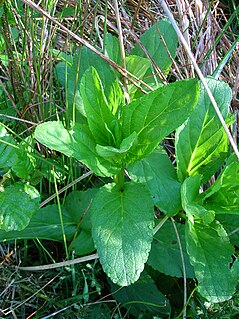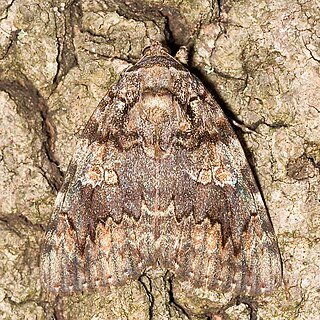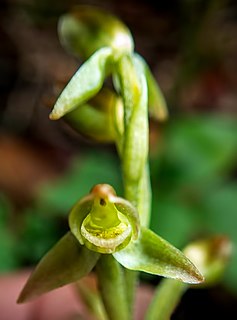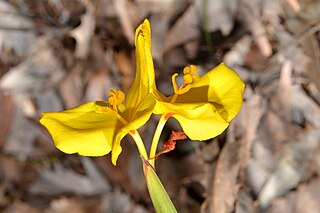Related Research Articles

Eridge Green is a 8.4-hectare (21-acre) biological Site of Special Scientific Interest north-east of Crowborough in East Sussex. It is part of the 44 hectares Eridge Rocks nature reserve, which is managed by Sussex Wildlife Trust.
Pavoraja umbrosa, commonly known as the dusky skate, is a species of fish in the family Arhynchobatidae. It lives off the coast of north-eastern Australia in depths ranging from 360 to 731 meters. Its maximum size is 36.9 cm (14.5 in) total length.

Scrophularia umbrosa, the green figwort, is a perennial herbaceous plant found in Europe and Asia. It grows in moist and cultivated waste ground.

Catocala umbrosa is a moth of the family Erebidae first described by Vernon Antoine Brou Jr. in 2002. It is found from Missouri and Louisiana east to Cuba and north through New Jersey to Canada.

The shadow darner is a species of dragonfly in the family Aeshnidae. It is found in almost all of Canada and most states in the United States.

Crossotini is a tribe of longhorn beetles of the subfamily Lamiinae. It was described by Thomson in 1864.

Moechotypa is a genus of longhorn beetles of the subfamily Lamiinae.
Moechotypa ceylonica is a species of beetle in the family Cerambycidae. It was described by Stephan von Breuning in 1938. It is known from Sri Lanka.
Moechotypa dalatensis is a species of beetle in the family Cerambycidae. It was described by Stephan von Breuning in 1968. It is known from Vietnam.
Moechotypa sikkimensis is a species of beetle in the family Cerambycidae. It was described by Stephan von Breuning in 1936. It is known from India.
Moechotypa trifasciculata is a species of beetle in the family Cerambycidae. It was described by Stephan von Breuning in 1936. It is known from Vietnam.
Moechotypa coomani is a species of beetle in the family Cerambycidae. It was described by Pic in 1934. It is known from Laos, Cambodia, and Vietnam.

Moechotypa diphysis is a species of beetle in the family Cerambycidae. It was described by Pascoe in 1871. It is known from Russia, China, Japan, North Korea, and South Korea. It feeds on plants such as Ailanthus altissima, Juglans regia, Zanthoxylum simulans, and Quercus glauca.

Moechotypa formosana is a species of beetle in the family Cerambycidae. It was described by Pic in 1917. It is known from Taiwan.
Moechotypa suffusa is a species of beetle in the family Cerambycidae. It was described by Pascoe in 1862. It is known from China, Cambodia, Thailand, Laos, and Vietnam.
Moechotypa uniformis is a species of beetle in the family Cerambycidae. It was described by Pic in 1922. It is known from Vietnam.

Aristobia umbrosa is a species of beetle in the family Cerambycidae. It was described by James Thomson in 1865, originally under the genus Celosterna. It is known from Malaysia, Borneo and Sumatra. It contains the varietas Aristobia umbrosa var. variefasciata.

Goodyera umbrosa, commonly known as the native jade orchid or green jewel orchid, is a species of orchid that is endemic to northern Queensland where it grows in highland rainforest. It has between four and eight large, egg-shaped leaves and up to ten small pale green or pinkish flowers with the dorsal sepal and petals forming a hood over the column.

Saxifraga umbrosa, called true London pride, none-so-pretty, king's feather, kiss-me-quick, leaf of St Patrick, look-up-and-kiss-me, mignonette of the French, Nancy-pretty, prattling Parnell, Pyrenean saxifrage, sailor plant, St Anne's needlework, St Patrick's cabbage, and whimsey, although some of these names may more properly belong to Saxifraga spathularis, or its hybrid with S. spathularis, Saxifraga × urbium, is a species of flowering plant in the family Saxifragaceae. It is native to the Pyrenees, and has been introduced elsewhere in Europe, and to southern Chile. Its cultivar 'Clarence Elliott' has gained the Royal Horticultural Society's Award of Garden Merit.

Patersonia umbrosa, commonly known as yellow flags, is a species of plant in the iris family Iridaceae and is endemic to the south-west of Western Australia. It is a loosely-tufted, rhizome-forming, perennial herb with linear to sword-shaped leaves and deep bluish-violet or bright yellow tepals.
References
- ↑ BioLib.cz - Moechotypa umbrosa. Retrieved on 8 September 2014.